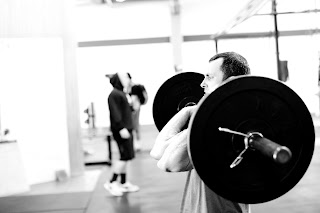I’m not the most coordinated person on this planet. You know that kid who could never tap on her head and make circles on
her belly at the same time? That was me. While I
can hold my own on the mountain bike trail and poke at mice brains, there are
certain things I will never do well, like dancing. Don’t even get me started on
“zumba”. So naturally I was a little nervous
when I joined a new gym class recently, especially since it involves learning
new movements. I’m always so envious of those who seem to learn new things
effortlessly, whose bodies respond immediately to what their brains are saying.
So I was very excited when I found out about new research that suggests all my
pain and suffering might pay off in the end.
It’s a common misconception that adult brains don’t grow.
For a long time, scientists thought adults had a finite number of brain cells,
and it was all downhill from there (grim, I know). We now know there is hope
for us all – some areas of your brain continue to grow brain cells throughout
your entire lifetime, at a rate of 5,000 to 10,000 new cells per day. Good news
right? Don’t get too excited. We also know that over half of those new cells
die within a few weeks of their birth.
Ok, get excited again (what a rollercoaster!): there are
things you can do to prevent the death of those brain cells, and one of those
things is learning new stuff.
In one recent experiment, scientists had three groups of
rats undergo a procedure called eyeblink conditioning. This experiment is based
on Pavlov’s work – he’s the one who found out that if you ring a bell shortly
before you feed your dog every day, eventually just ringing the bell will be
enough to activate the dog’s saliva glands. Eyeblink conditioning is very
similar – it involves ringing a bell and then stimulating the rat’s eye,
leading to a blink. Eventually the rat learns to blink when it hears the bell
without the need for the actual stimulation.
The researchers carried out the eyeblink conditioning with
three groups of rats. One group received a drug that prevented them from
learning anything, one group received a drug that made learning easier, and one
group didn’t get any drug (that would be the control group). After the rats
went through learning (or attempting to learn) the eyeblink procedure, the
researchers looked at how many new brain cells had been saved by the process.
The rats that received the drug that prevented from learning
predictably didn’t learn anything and also predictably didn’t save any new
brain cells. The rats that received the drug that helped them learn saved new
brain cells, but no more and no less than the group of rats that learned without
any drug. Pretty boring results so far, yes?
But wait! The researchers then closely looked at all the
animals that learned the task and reanalyzed how many new brain cells they
saved based on how long the rats took to learn to blink. What they found was
most intriguing: the longer a rat took to learn the task, the more new brain
cells it saved, regardless of whether it received the drug or not.
What this means is that the best way to save a maximum
amount of new brain cells is by having a hard time learning something but
ultimately being successful.
Now don’t go bragging about being a slow learner just yet - for one thing,
the timing of the experiments I described above is very tricky (especially the
timing between the eyeblink conditioning and when new cells are counted). We also know very little about the role of those new brain cells and whether they get integrated in existing networks in the brain, and I
don’t need to remind you that results obtained in rats don’t necessarily apply
to us. That said, it’s well proven that learning is good for your overall brain
health, so go ahead and join that zumba class.
Reference: Curlik DM and Shors TJ (2011) Learning increases
the survival of newborn neurons provided that learning is difficult to achieve
and successful. J Cogn Neurosci 23(9):2159-2170.





2 Responses to “Save your brain cells”
Excellent!! I was a total klutz in school, too. I didn't figure out how to serve a volleyball until university, and then it suddenly just worked... maybe because I was learning so much other hard stuff at school? ;)
Now I think I'll go pull out some new music to learn at the piano...
Ha, maybe so, Fawn! Though I'm not sure about one type of learning precluding another. I'll have to look it up! I know the feeling, though - I could only ever do stuff in the water, because so little balance is needed in the pool...
Already starting on the next album, are you? :)
Post a Comment